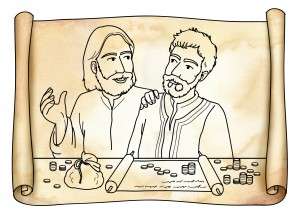
The parables of Jesus often disturb our equilibrium, and stretch the boundaries of our common perceptions. Such is the parable in Matthew 25:14-30. A master goes away on a long journey and entrusts his property to three servants. To one he gives five talents, to another two talents, and to another one talent, each according to their ability. The first two servants begin to work at once, multiplying what they’ve been given. The third servant digs a hole in the ground and hides his master’s money.
The master is Jesus, and the servants are professing believers.
After a long time, the master returns and settles accounts. The first two servants have doubled their master’s investment, proving themselves faithful in his absence. The master praises the two servants, gives them additional responsibilities, and invites them to come and share his joy. It’s tempting to think this parable is about money—but it’s not.
The emphasis of the parable is on the third servant. When confronted about his stewardship of the one talent that he hid in the ground, he blames the master and gives excuses. “Master, I knew you to be a hard man…so I was afraid, and I hid your talent in the ground. See, here is what belongs to you.”
The master responds, “You wicked, lazy servant…you should at least have put my money into the bank so I could have some interest.”
Does the master’s reaction seem a little harsh? The servant didn’t steal the money, or lie about the money, or squander it on something immoral. He protected the money. Sure, he could have done more, but at least he didn’t misuse the money. Again, the parable is not about the money.
What crime has he committed that makes Jesus reject him?
The first two servants are praised for being actively engaged in the master’s business. In contrast to the first two, the third servant is passive. He does one thing at the beginning (hides the money), and then makes no effort at all to serve his master for a very long time—years—possibly a lifetime.
The Greek lexicon gives this definition of the word lazy, “idle, shrinking from or hesitating to engage in something worthwhile.” The master calls the servant’s idleness, wicked.
The master then pronounces a severe judgment, “Throw that worthless servant outside into the darkness, where there will be weeping and gnashing of teeth.” Seven times in the gospels Jesus mentions the place where there will be weeping and gnashing of teeth (Matthew 8:12; 13:42; 13:50; 22:13; 24:51; 25:30; Luke 13:28). This place refers to eternal Hell.
I shudder at this extreme punishment for what seems a lesser offense than what was committed by the prodigal son, or the apostle Paul, or Samson’s dereliction of duty. The third servant is being cast out of his master’s presence into hell. What conclusions can we make?
• Passivity over a lifetime indicates an unregenerate heart, someone who doesn’t truly know Christ.
• Passivity indicates he doesn’t love his master, finds no joy in serving him, and isn’t motivated to take risks for him. These also indicate the condition of his heart.
• He thinks he’s done the minimum required, but he’s deceived—there is no minimum.
• When confronted by the master, he doesn’t repent, but makes excuses.
• He isn’t faithful in serving Christ, because he is faith-less—he has no faith.
Now the application: How will Jesus evaluate your life? And mine? And what about our friends and loved ones who fit the description of the third servant? If we claim to love the Lord, but live a lifetime of passivity in serving him, our actions negate our words, and expose our heart.
Once again this points out the importance of not just reading God’s Word, but going deep, asking questions, measuring our life against the Scriptures. Unfortunately, many in the category of the third servant are also passive in their Bible study.
I would love to get your insights and feedback on this sobering parable.


Janet,
Thank you for an excellent explanation of a challenging passage. I appreciate you asking the questions many of us may have thought.
Although memorizing Scripture is not directly commanded in the Bible and is not a condition of my salvation, what I appreciate about memorizing and meditating on longer passages is that it is taking me into more active sanctification. As I store God’s Word in my mind, He uses it in transforming my heart, influencing my words and guiding my actions – displacing my old thoughts and habits.
Amen Janet. What and why (for the praise/fear of men OR for the praise and fear of God) we do things reveals our heart. In Matthew 7:21-23 there is the man who pleads Lord, Lord, have we not prophesied in Your name, cast out demons in Your name, and done many wonders in Your name? And then Jesus says to them, I never knew you; depart from Me, you who practice lawlessness!
Even to some it would appear they were followers of Jesus yet they were still practicing lawlessness which as you said Janet exposes their/our heart.
Thanks Janet for writing on this topic as we are in end times and Jesus said people will want to “hear” what tickles their ears (false teaching) -peace, peace…..yet Jesus when He returns comes as Judge -2Tim4:1-5-starting with those in the House of God -1Pet4:17- (of which contain many who have head knowledge of Jesus but have not been regenerated/born again – never truly repented and believed wholeheartedly in the Lord Jesus as Savior and how He bought us with His blood, our life is no longer our own (1Cor.6:19-20), but our lives come under the submission to King Jesus – slaves to God no longer slaves to sin. (Rom 6:15-23)
PRAISE THE LORD JESUS!!! OUR RESCUE!!! OUR KING!!!
Very clearly explained, Janet. Looks like it boils down to the condition of the guy’s heart which his lack of action exposes. Excellent dissection of this parable which can be confusing.
Janet, How will I fare when my Master returns and settles accounts with me? He has blessed me with forgiveness, healing, redemption, steadfast love, salvation, eternal life, but have I been faithful to bear fruit, both in my own life and in other people’s? This is where I think Scripture memory can help to make up for lost time. It enables me to convert oft wasted moments into opportunities to grow in Christ and bear fruit for Him. The Bible is a precious treasure my Master entrusted to me. If having read and studied it, I invest further effort and discipline to commit it to memory, it will generate constant reminders to praise, bless, trust, and serve the Lord. How wonderful that this “memory bank” can be used by the Holy Spirit to continuously produce spiritual interest and dividends as I meditate on God and His law day and night. By God’s grace, having His Word in my heart will spur me onto more faithfulness and fruitfulness. Lord, I want to be a servant faithful over a few things.
Thank you Janet for sharing your insight on this parable. It is perfect timing for me and I plan to share it with others. It is so easy to get comfortable in this day and age. We forget we have to keep investing our knowledge in Christ with others.